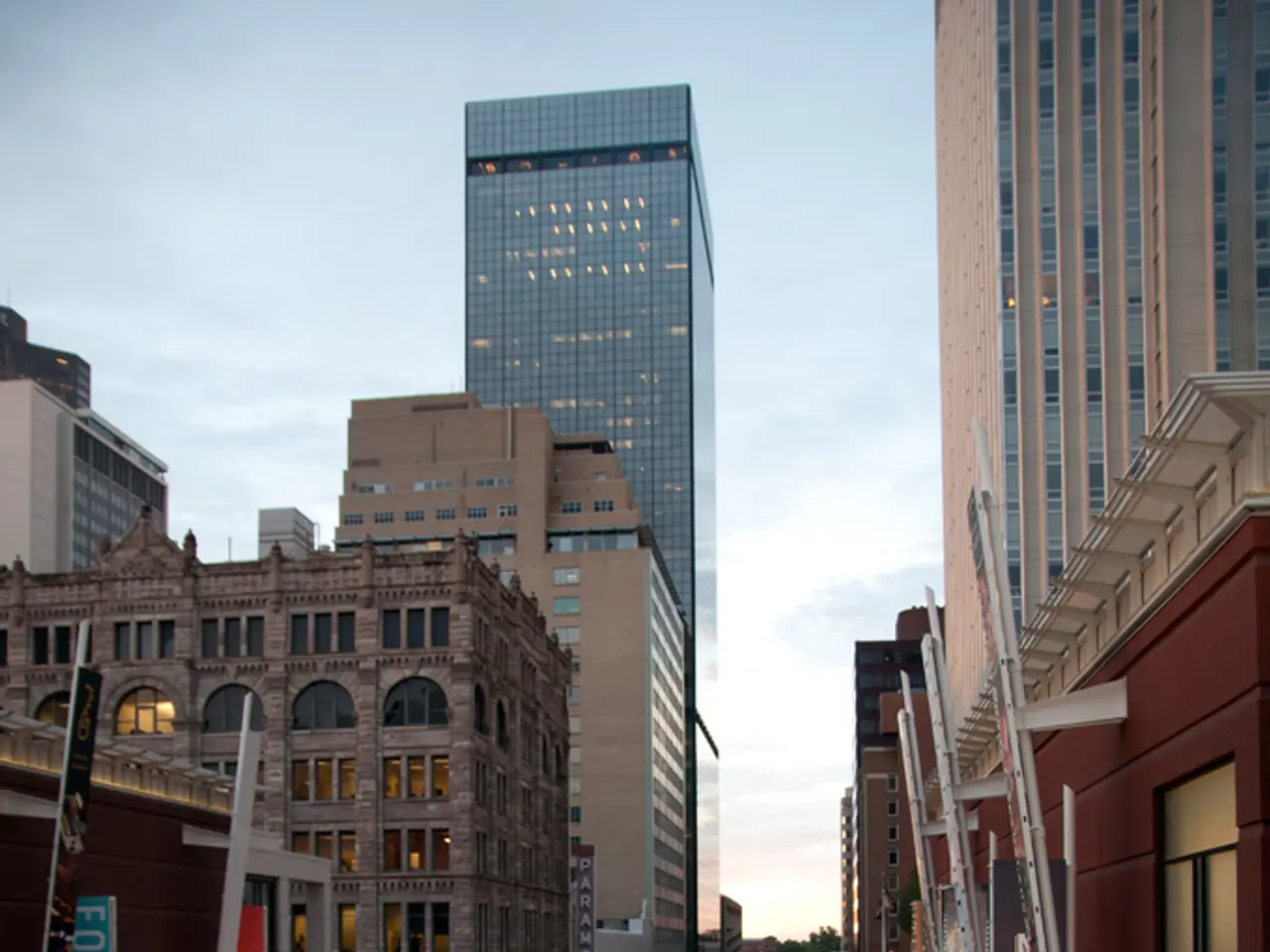Progressive politicians make strides in American urban centers, coinciding with intensifying corporate disapproval
In the political landscape of modern America, cities like New York and Minneapolis are seeing a shift towards more progressive policies. This shift, led by candidates like Zohran Mamdani and Omar Fateh, has raised questions about the potential economic impacts of these changes.
In New York City, if Mamdani's progressive policies are implemented, there could be significant economic shifts. One of the proposed changes is a steep increase in property taxes for the wealthy, which could generate substantial city revenue but might also affect investment and real estate markets. Another proposal is making public buses free, a move aimed at reducing transportation costs for low-income residents and potentially increasing mobility and economic activity. However, funding such a program would require creative financial solutions.
Mamdani has also pledged to protect tenants from rising costs by implementing rent freezes on rent-stabilized housing and rent-controlled apartments. While this would aim to help those struggling with affordability, it could discourage landlords from investing in maintenance or new developments, potentially impacting the housing market supply dynamics.
Moreover, Mamdani has proposed increasing the minimum wage to $30 an hour by 2030, a move that could boost income for low-wage workers but raise labor costs for businesses, potentially affecting employment rates and prices. The establishment of city-owned grocery stores in underserved neighborhoods is another proposal aimed at improving food access and stimulating local economies, but it represents a new municipal involvement in retail that comes with financial risks and operational challenges.
Providing free child care would support working families, potentially increasing labor force participation, but requires sustained public investment. However, the feasibility of these progressive proposals may be limited by political opposition from state and federal governments, requiring compromises.
In Minneapolis, Omar Fateh, another DSA-backed candidate, has proposed implementing a rent stabilization policy, creating a local income tax and a commercial vacancy tax, and creating a land value tax to incentivize development of underutilized parcels. These proposals, if implemented, could have significant economic implications for the city.
The trend of businesses leaving progressive-run cities, such as San Francisco, due to high taxes and other issues, may continue. Cities like Chicago, under the leadership of Mayor Brandon Johnson, elected on a progressive platform, are facing concerns about high taxes and public safety issues in keeping companies. This electoral success may have unintended consequences for the local economy.
In conclusion, the implementation of progressive policies could promote greater economic equity and service access for low-income residents, but would require increased public spending, higher taxes on wealthier residents, and innovative management of public services. The net economic impact depends on the balance between increased social welfare and the costs to businesses and taxpayers. As these policies unfold, it will be interesting to see how they shape the economic landscape of these cities.
[1] Source: https://www.nytimes.com/2021/06/23/nyregion/mamdani-new-york-city-mayoral-race.html [2] Source: https://www.nytimes.com/2021/07/20/nyregion/mamdani-platform-nyc-mayoral-race.html [3] Source: https://www.politico.com/states/new-york/albany/story/2021/07/20/new-york-city-mayoral-candidate-zohran-mamdani-pushes-for-progressive-policies-despite-political-hurdles-1405822
- The shift towards progressive policies in cities like New York could lead to a rise in property taxes for the wealthy, impacting the real estate market's investment opportunities.2.Implementing rent freezes on rent-stabilized housing and apartments could help tenants struggling with affordability, but might discourage maintenance investments by landlords, affecting the housing market.
- Progressive policies could boost income for low-wage workers, but increases in minimum wage could also raise labor costs, potentially affecting employment rates and prices.
- City-owned grocery stores in underserved neighborhoods aim to improve food access and stimulate local economies, but come with financial risks and operational challenges.
- Providing free child care has the potential to increase labor force participation, but requires sustained public investment.
- Rent stabilization policies, created by candidates like Omar Fateh in Minneapolis, could have significant economic implications for the city.
- The trend of businesses leaving progressive-run cities due to high taxes and other issues could continue, as seen in San Francisco.
- In Chicago, a city under the leadership of Mayor Brandon Johnson, elected on a progressive platform, concerns about high taxes and public safety issues for businesses persist.
- The implementation of progressive policies could result in increased public spending, higher taxes on wealthier residents, and innovative management of public services.10.A potential drawback of these policies is that they could impact the business environment, as higher taxes and operational changes could lead to companies leaving or avoiding the cities where they are implemented.
- Progressive policies aim to promote greater economic equity and service access for low-income residents, but their long-term impact on the overall economy remains uncertain.
- Entrepreneurship and small businesses might face challenges due to higher costs of doing business under progressive policies, affecting job creation and the local economy.
- The economic and policy changes brought about by progressive leaders like Mamdani and Fateh may have unforeseen consequences for the cities they govern, making it essential for careful policy-and-legislation development and responsible leadership.
- The gambling industry in cities like Las Vegas may experience shifts in trends and policy due to differences in elected leaders and governing policies, as seen with changes in gaming taxes or regulations.
- As these progressive policies unfold, monitoring casino-personalities, gambling-trends, and related casino-culture is crucial for understanding their influence on the economy and general-news, including crime-and-justice, accidents, fires, goal-setting, and responsible-gambling measures.




